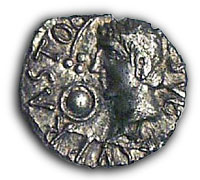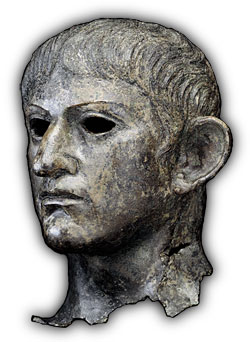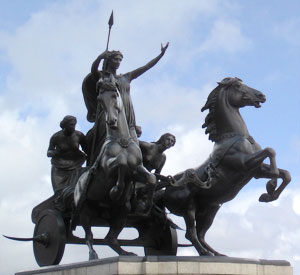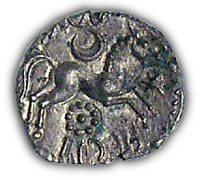BOUDICA’S REBELLION
When Claudius (emperor 41–54) invaded Britain, in 43, the Iceni offered no opposition, and voluntarily accepted Roman domination. They were granted the status of ‘client-kingdom’. A client-kingdom, though subject to Rome, was governed by its own native ruler. The Romans avoided the expense of garrisoning the territory; the client-king (or, indeed, queen) kept the peace, and was assured wealth and Roman backing against rivals. There may well have been others, but the names of only three British client-rulers are known, all of whom were in-place in 58, when Gaius Suetonius Paullinus became governor of the Roman province.[*] Queen Cartimandua, of the Brigantes, ruled in (what is now) northern England, which was beyond the frontier of the province. Within the boundaries of the province, King Togidubnus ruled south of the middle Thames[*], and King Prasutagus, of the Iceni, in East Anglia. Prasutagus’ wife is, though, much more famous than these rulers. She was called Boudica.
bou01

diameter 13mm.
In the year 60, Suetonius Paullinus undertook a campaign on the island of Mona (Anglesey), a stronghold of the Druids and the British resistance movement. He was interrupted by news that a rebellion had broken-out in his absence.[*] Shortly before, Prasutagus had died. His contract with Rome had died with him, and Rome had evidently decided there would be no successor and the kingdom would be annexed. However, perhaps because the governor was not there to impose proper discipline, Roman officials dealt with the business in an outrageously brutal fashion. Tacitus, in the Annals:
The king of the Iceni, Prasutagus, celebrated for his long prosperity, had named the emperor [Nero, 54–68] his heir, together with his two daughters; an act of deference which he thought would place his kingdom and household beyond the risk of injury. The result was contrary – so much so that his kingdom was pillaged by centurions, his household by slaves; as though they had been prizes of war. As a beginning, his wife Boudicca was subjected to the lash and his daughters violated. Then, as though Rome had received the entire country as a gift, all the chief men of the Iceni were stripped of their family estates, and the relatives of the king were treated as slaves. Impelled by this outrage and the dread of worse to come – for they had now been reduced to the status of a province – they flew to arms, and incited to rebellion the Trinovantes and others, who, not yet broken by servitude, had entered into a secret and treasonable compact to resume their independence.Annals XIV, 31
It would appear that the treatment of the Iceni was just the final straw. There was already pent-up anger at high-handed Roman behaviour. In his Agricola, Tacitus voices the Britons’ discontent:
No sooner had the legate’s [i.e. the governor’s] absence removed their fear than the Britons began to discuss the evils of their slavery, to compare their wrongs, and to fan their resentment by putting the worst interpretation upon them. All that patience could gain, they murmured, was the imposition of yet heavier burdens on their easy tolerance. In old days the tribes had each one king, now they had two. The legate drained their blood, the procurator [the official in charge of a province’s finances] their purse. The quarrels of their masters were as deadly to the subjects as their concord. The legate’s centurions, the procurator’s slaves, combined violence with insult. Nothing was now safe from their greed or from their lust. “In battle,” they cried, “it is the brave who win the spoil. As things are now, it is for the most part cowards and weaklings that plunder our homes, kidnap our children, and conscript our men. We can die, it seems, in any cause except our country’s! Let the Britons number themselves: how small then seems the invader’s force! It was thus that the peoples of Germany flung off the yoke: yet their bulwark was a river [i.e. the Rhine] not the Ocean. We have our country to fight for, our parents and our wives: the invaders’ motives are but greed and self-indulgence. They will retire, as the deified Julius retired before, can we but rival our fathers’ spirit. Nor must we lose heart at the result of one or two engagements: despair breeds more fury and more determination. See! already the gods pity Britain. The Roman general is away, his army deported to another island; and here are we met to debate – the hardest step of all! Besides, in plans of this kind daring is safer than discretion.”
Fired with such reflections as these they all went to war, led by Boudicca, a lady of royal descent; for in their commands they make no distinction of sex.Agricola 15–16
Cassius Dio (in Xiphilinus’ abridgement) makes no mention of Prasutagus, the brutal treatment of the Iceni, nor the Trinovantes, but highlights particular economic grievances:
An excuse for the war was found in the confiscation of the sums of money that Claudius had given to the foremost Britons; for these sums, as Decianus Catus, the procurator of the island, maintained, were to be paid back. This was one reason for the uprising; another was found in the fact that Seneca, in the hope of receiving a good rate of interest, had lent to the islanders ten million [denarii] that they did not want, and had afterwards called in this loan all at once and had resorted to severe measures in exacting it. But the person who was chiefly instrumental in rousing the natives and persuading them to fight the Romans, the person who was thought worthy to be their leader and who directed the conduct of the entire war, was Boudouica, a Briton woman of the royal family and possessed of greater intelligence than often belongs to women. This woman assembled her army, to the number of some one hundred and twenty thousand, and then ascended a tribunal which had been constructed of earth in the Roman fashion. In stature she was very tall, in appearance most terrifying, in the glance of her eye most fierce, and her voice was harsh; a great mass of the tawniest hair fell to her hips; around her neck was a large golden necklace; and she wore a tunic of divers colours over which a thick mantle was fastened with a brooch. This was her invariable attire.Roman History (Epitome, Xiphilinus) LXII, 2
At this point in his narrative, Dio puts a lengthy rallying speech into Boudica’s mouth[*].
Having finished an appeal to her people of this general tenor, Boudouica led her army against the Romans; for these chanced to be without a leader, inasmuch as Paulinus, their commander, had gone on an expedition to Mona, an island near Britain.Roman History (Epitome, Xiphilinus) LXII, 7
(Whilst Dio refers to the governor as Paulinus in his account, Tacitus calls him Suetonius.) The first target of Boudica’s army was the colonia – colony of retired legionaries (established, probably in 49, by, the then governor, Publius Ostorius Scapula) – at Camulodunum (Colchester, Essex), in the territory of the Trinovantes. Tacitus:
The bitterest animosity was felt against the veterans recently settled in the colonia of Camulodunum, who were driving the natives from their homes, ejecting them from their lands – they styled them “captives” and “slaves” – and their lawlessness was encouraged by the troops, with their similar mode of life and their hopes of equal indulgence. More than this, the temple raised to the deified Claudius continually met the view, like the citadel of an eternal tyranny; while the priests, chosen for its service, were bound under the pretext of religion to pour out their fortunes like water.[*] Nor did there seem any great difficulty in the demolition of a colonia unprotected by fortifications – a point too little regarded by our commanders, whose thoughts had run more on the agreeable than on the useful.

Meanwhile, for no apparent reason, the statue of Victory at Camulodunum fell, with its back turned as if in retreat from the enemy. Women, converted into maniacs by excitement, cried that destruction was at hand and that alien cries had been heard in their senate-house: the theatre had rung with shrieks, and in the estuary of the Thames had been seen a vision of the ruined colonia. Again, that the Ocean had appeared blood-red and that the ebbing tide had left behind it what looked to be human corpses, were indications read by the Britons with hope and by the veterans with corresponding alarm.[*] However, as Suetonius was far away, they applied for help to the procurator Catus Decianus [who was probably based at Londinium, i.e. London]. He sent not more than two hundred men, without their proper weapons. In addition, there was a small body of troops there. Relying on the protection of the temple, and hampered also by covert adherents of the rebellion who interfered with their plans, they neither secured their position by fosse or rampart nor took steps, by removing the women and the aged, to leave only able-bodied men in the place. They were as carelessly guarded as if the world was at peace, when they were enveloped by a great barbarian host. All else was pillaged or fired in the first onrush: only the temple, in which the troops had massed themselves, stood a two days’ siege, and was then carried by storm. Turning to meet Petilius Cerialis, legate of the Ninth Legion [Legio IX Hispana[*]], who was arriving to the rescue, the victorious Britons routed the legion and slaughtered the infantry to a man: Cerialis with the cavalry escaped to their camp, and found shelter behind its fortifications.[*] Unnerved by the disaster and the hatred of the province which his rapacity had goaded into war, the procurator Catus crossed to Gaul.Tacitus Annals XIV, 31–32
Now it chanced that Paulinus had already brought Mona to terms, and so on learning of the disaster in Britain he at once set sail thither from Mona.Cassius Dio Roman History (Epitome, Xiphilinus) LXII, 8
Suetonius … with remarkable firmness, marched straight through the midst of the enemy upon Londinium; which, though not distinguished by the title of colonia, was none the less a busy centre, chiefly through its crowd of merchants and stores. Once there, he felt some doubt whether to choose it as a base of operations; but, on considering the fewness of his troops and the sufficiently severe lesson which had been read to the rashness of Petilius, he determined to save the country as a whole at the cost of one town. The laments and tears of the inhabitants, as they implored his protection, found him inflexible: he gave the signal for departure, and embodied in the column those capable of accompanying the march: all who had been detained by the disabilities of sex, by the lassitude of age, or by local attachment, fell into the hands of the enemy. A similar catastrophe was reserved for the municipium of Verulamium [St Albans, Hertfordshire]; as the natives, with their delight in plunder and their distaste for exertion, left the forts and garrison-posts on one side, and made for the point which offered the richest material for the pillager and was unsafe for a defending force. It is established that close upon seventy thousand Roman citizens and allies fell in the places mentioned. For the enemy neither took captive nor sold into captivity; there was none of the other commerce of war; he was hasty with slaughter and the gibbet, with arson and the cross, as though his day of reckoning must come, but only after he had snatched his revenge in the interval.Tacitus Annals XIV, 33
Those who were taken captive by the Britons were subjected to every known form of outrage. The worst and most bestial atrocity committed by their captors was the following. They hung up naked the noblest and most distinguished women and then cut off their breasts and sewed them to their mouths, in order to make the victims appear to be eating them; afterwards they impaled the women on sharp skewers run lengthwise through the entire body. All this they did to the accompaniment of sacrifices, banquets, and wanton behaviour, not only in all their other sacred places, but particularly in the grove of Andate. This was their name for Victory, and they regarded her with most exceptional reverence.[*]
… [Paulinus] was not willing to risk a conflict with the barbarians immediately, as he feared their numbers and their desperation, but was inclined to postpone battle to a more convenient season. But as he grew short of food and the barbarians pressed relentlessly upon him, he was compelled, contrary to his judgment, to engage them.Cassius Dio Roman History (Epitome, Xiphilinus) LXII, 7–8
Suetonius had already the Fourteenth Legion [Legio XIV Gemina], with a detachment of the Twentieth [Legio XX] and auxiliaries from the nearest stations, altogether some ten thousand armed men, when he prepared to abandon delay and contest a pitched battle. He chose a position approached by a narrow defile and secured in the rear by a wood, first satisfying himself that there was no trace of an enemy except in his front, and that the plain there was devoid of cover and allowed no suspicion of an ambuscade. The legionaries were posted in serried ranks, the light-armed troops on either side, and the cavalry massed on the extreme wings. The British forces, on the other hand, disposed in bands of foot and horse were moving jubilantly in every direction. They were in unprecedented numbers, and confidence ran so high that they brought even their wives to witness the victory and installed them in wagons, which they had stationed just over the extreme fringe of the plain.Tacitus Annals XIV, 34
Boudouica, at the head of an army of about two hundred and thirty thousand men, rode in a chariot herself and assigned the others to their several stations. Paulinus could not extend his line the whole length of hers, for, even if the men had been drawn up only one deep, they would not have reached far enough, so inferior were they in numbers; nor, on the other hand, did he dare join battle in a single compact force, for fear of being surrounded and cut to pieces. He therefore separated his army into three divisions, in order to fight at several points at one and the same time, and he made each of the divisions so strong that it could not easily be broken through.Cassius Dio Roman History (Epitome, Xiphilinus) LXII, 8

(There is no evidence to suggest that British chariots had blades attached to their wheels.)
Boudicca, mounted in a chariot with her daughters before her, rode up to clan after clan and delivered her protest:— It was customary, she knew, with Britons to fight under female captaincy; but now she was avenging, not, as a woman of glorious ancestry, her kingdom and wealth, but, as a woman of the people, her liberty lost, her body tortured by the lash, the tarnished honour of her daughters. Roman cupidity had progressed so far that it left nothing unpolluted – not even the persons of their old or their young maidens. Yet the gods were on the side of their just revenge: one legion, which ventured battle, had perished; the rest were skulking in their camps, or looking around them for a way of escape. They would never endure even the din and roar of so many thousands, far less their onslaught and blows. If they considered in their own hearts the forces under arms and the motives of the war, on that field they must conquer or fall. Such was the settled purpose of a woman – the men might live and be slaves!
Even Suetonius, in this critical moment, broke silence. In spite of his reliance on the courage of the men, he still blended exhortations and entreaty:— They must treat with contempt the noise and empty menaces of the barbarians: in the ranks opposite, more women than soldiers met the eye. Unwarlike and unarmed, they would break immediately, when, taught by so many defeats, they recognized once more the steel and the valour of their conquerors. Even in a force of many legions, it was but a few men who decided the fate of battles; and it would be an additional glory that they, a handful of troops, were gathering the laurels of an entire army. Only, keeping their order close, and, when their javelins were discharged, employing shield-boss and sword, let them steadily pile up the dead and forget the thought of plunder: once the victory was gained, all would be their own. Such was the ardour following the general’s words – with such alacrity had his seasoned troops, with the long experience of battle, prepared themselves in a moment to hurl the javelin – that Suetonius, without a doubt of the issue, gave the signal to engage.Tacitus Annals XIV, 35–36
(The speeches attributed to Boudica and Suetonius Paullinus, by both Tacitus and Cassius Dio, are of course literary devices, not historically accurate reports. In Dio’s version of events, Paullinus had divided his army into three divisions, and he delivers speeches to each division[*].)
At first, the legion stood motionless, keeping to the defile as a natural protection: then, when the closer advance of the enemy had enabled them to exhaust their missiles with certitude of aim, they dashed forward in a wedge-like formation. The auxiliaries charged in the same style; and the cavalry, with spears extended, broke a way through any parties of resolute men whom they encountered.Tacitus Annals XIV, 37
… the armies approached each other, the barbarians with much shouting mingled with menacing battle-songs, but the Romans silently and in order until they came within a javelin’s throw of the enemy. Then, while their foes were still advancing against them at a walk, the Romans rushed forward at a signal and charged them at full speed, and when the clash came, easily broke through the opposing ranks; but, as they were surrounded by the great numbers of the enemy, they had to be fighting everywhere at once. Their struggle took many forms. Light-armed troops exchanged missiles with light-armed, heavy-armed were opposed to heavy-armed, cavalry clashed with cavalry, and against the chariots of the barbarians the Roman archers contended. The barbarians would assail the Romans with a rush of their chariots, knocking them helter-skelter, but, since they fought without breastplates, would themselves be repulsed by the arrows. Horseman would overthrow foot-soldier and foot-soldier strike down horseman; a group of Romans, forming in close order, would advance to meet the chariots, and others would be scattered by them; a band of Britons would come to close quarters with the archers and rout them, while others were content to dodge their shafts at a distance; and all this was going on not at one spot only, but in all three divisions at once. They contended for a long time, both parties being animated by the same zeal and daring. But finally, late in the day, the Romans prevailed; and they slew many in battle beside the wagons and the forest, and captured many alive.Cassius Dio Roman History (Epitome, Xiphilinus) LXII, 12
The remainder [of the Britons] took to flight, although escape was difficult, as the cordon of wagons had blocked the outlets. The troops gave no quarter even to the women: the baggage animals themselves had been speared and added to the pile of bodies. The glory won in the course of the day was remarkable, and equal to that of our older victories: for, by some accounts, little less than eighty thousand Britons fell, at a cost of some four hundred Romans killed and a not much greater number of wounded. Boudicca ended her days by poison; while Poenius Postumus, camp-prefect of the Second Legion [Legio II Augusta], informed of the exploits of the men of the Fourteenth and Twentieth, and conscious that he had cheated his own corps of a share in the honours and had violated the rules of the service by ignoring the orders of his commanding officer [i.e. Suetonius Paullinus], ran his sword through his body.Tacitus Annals XIV, 37
bou04
Nevertheless, not a few [Britons] made their escape and were preparing to fight again. In the meantime, however, Boudouica fell sick and died. The Britons mourned her deeply and gave her a costly burial; but, feeling that now at last they were really defeated, they scattered to their homes. So much for affairs in Britain.Cassius Dio Roman History (Epitome, Xiphilinus) LXII, 12
Had not Paulinus heard news of the outbreak in the province, and hurried to bring aid, Britain would have been lost. But one successful battle restored it to its former obedience. Many, however, retained their arms. They knew that they were rebels; and their dread of the legate [i.e. Suetonius Paullinus] proved a still stronger motive. He was a fine man in many ways, but might he not be too harsh, if they surrendered, and avenge every wrong as if it was an insult to himself? This was their fear.Tacitus Agricola 16
The whole army was now concentrated and kept under canvas, with a view to finishing what was left of the campaign. Its strength was increased by Caesar [i.e. Emperor Nero], who sent over from Germany two thousand legionaries, eight cohorts of auxiliaries, and a thousand cavalry. Their advent allowed the gaps in the Ninth Legion to be filled with regular troops; the [auxiliary] cohorts and alae [i.e. cavalry wings] were stationed in new winter quarters; and the tribes which had shown themselves dubious or disaffected were harried with fire and sword. Nothing, however, pressed so hard as famine on an enemy who, careless about the sowing of his crops, had diverted all ages of the population to military purposes, while marking out our supplies for his own property. In addition, the fierce tribes inclined the more slowly to peace because Julius Classicianus, who had been sent in succession to Catus and was not on good terms with Suetonius, was hampering the public welfare by his private animosities, and had circulated a report that it would be well to wait for a new legate; who, lacking the bitterness of an enemy and the arrogance of a conqueror, would show consideration to those who surrendered. At the same time, he reported to Rome that no cessation of fighting need be expected unless a successor was appointed for Suetonius, the failures of whom he attributed to his perversity, his successes to good luck.
Accordingly Polyclitus, one of the [imperial] freedmen, was sent to inspect the state of Britain, Nero cherishing high hopes that, through his influence, not only might a reconciliation be effected between the legate and the procurator, but the rebellious temper of the barbarians be brought to acquiesce in peace. Polyclitus, in fact, whose immense entourage had been a burden to Italy and Gaul, did not fail, when once he had crossed the Ocean, to inspire terror among our soldiers as well. To the enemy, on the other hand, he was a subject of derision: with them, the fire of freedom was not yet quenched; they had still to make acquaintance with the power of freedmen, and they wondered that a general and an army who had accounted for such a war should obey slaves. Nonetheless, everything was reported to the emperor in a more favourable light. Suetonius was retained at the head of affairs; but, when later on he lost a few ships on the beach, and the crews with them, he was ordered, under pretence that the war was still in being, to transfer his army to Petronius Turpilianus, who by now had vacated the consulship. The newcomer neither provoked the enemy, nor was challenged by them, and conferred on this spiritless inaction the honourable name of peace.Tacitus Annals XIV, 38–39
